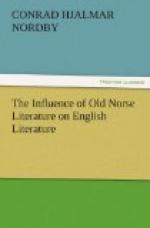The two romances last mentioned are so steeped in the atmosphere of the sagas, that what with folk-motes and shut-beds, and byres, and man-quellers, and handsels and speech-friends, we seem to lose ourselves in yet another version of a northern tale. Morris retains the old idiom that he invented for his translations, and keeps the tyro thumbing his dictionary, but the charm is increased by the archaisms. As one seeks the words in the dictionary, one learns that Chaucer, Spenser and the Ballads were the wells from which he drew these rare words, and that his employment of them is only another phase of his love for the old far-off things. It is true that the language of Morris is not of any one stadium of English, but it is a poet’s privilege to draw upon all history for his words as well as for his allusions, and the revivals in question are of worthy words pushed aside by the press of newer, but not necessarily better forms.
These works are the kind that show the influence of Old Norse literature as spiritual rather than substantial. The stories are not drawn from the older literature, nor are the settings patterned after it; but the impulses that swayed men and women in the sagaman’s tale, and the motives that uplifted them, are found here. We cannot think that the English people will always be unmindful of the great debt that they owe to the Muse of the North.
7.
In 1891, Morris engaged in a literary enterprise that set the fashion for similar enterprises in succeeding years. With Eirikr Magnusson he undertook the making of The Saga Library, “addressed to the whole reading public, and not only to students of Scandinavian history, folk-lore and language."[33] With Bernard Quaritch’s imprint on the title pages, these volumes to the number of five were issued in exceptional type and form. The munificence of the publisher was equalled by the skill of the translators, and in their versions of “Howard,




